- About
-
Advocacy
- Submit Legislative Proposals to the ILA Public Policy Committee
- Advocacy Policies and Procedures
- More Than a Building
- Census 2020 Resources
- Creating or Changing Illinois State Library Law
- Illinois Minimum Wage Resources
- Intro to Property Taxes for IL Libraries
- ILA Public Policy Principles
- Legislative Issues
- Libraries and Immigration Enforcement
- Making Your Case
- Ready, Set, Advocate
- TIFs and Public Library Districts in Illinois
- Top Ten Advocacy Tips
- Unite Against Book Bans in Illinois
-
Committees
- Frequently Asked Questions (FAQ) about ILA Committees
- Advocacy Committee
- Awards Committee
- Conference Program Committee, 2025
- Conference Program Committee, 2026
- Diversity Committee
- Finance Committee
- Fundraising Committee
- ILA Reporter Advisory Committee
- Illinois Libraries Present Committee
- Illinois Public Library Standards Committee
- Intellectual Freedom Committee
- iREAD Committee
- Nominating Committee
- Public Policy Committee
- Reaching Forward North Committee
- Reaching Forward South Committee
- Events
-
Forums
- Frequently Asked Questions (FAQ) about ILA Forums
- Human Resources & Administration Forum (HRAF)
- Illinois Association of College & Research Libraries Forum (IACRL)
- Library Trustee Forum (LTF)
- Marketing Forum (MF)
- Resources & Technical Services Forum (RTSF)
- Retired Members Forum
- Small and Rural Libraries Forum (SARL)
- Students and New Professionals Forum (SANP)
- Young Adult Services Forum (YASF)
- Youth Services Forum (YSF)
- Initiatives
- Membership
- Publications
This bibliography represents books challenged, restricted, removed, or banned in 2009 and 2010 as reported in the Newsletter on Intellectual Freedom from May 2009-May 2010. (A date prior to May 2009 indicates the controversy began earlier, but continues into 2010.)
Alexie, Sherman
The Absolutely True Diary of a Part Time Indian
Thorndike Pr.; Little
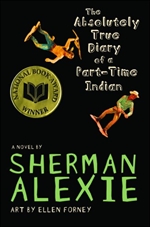
Retained on the summer reading list at Antioch, Ill. High School (2009) despite objections from several parents who found its language vulgar and racist. In response to concerns, however, the district will form a committee each March to review future summer reading assignments. The committee, which will include parents, would decide whether parents should be warned if a book contains possibly objectionable material.
Source: Newsletter on Intellectual Freedom, Sept. 2009, p. 171.
Anderson, Laurie Halse
Twisted
Viking
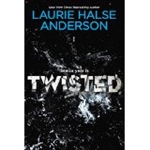
Withdrawn from classroom use and the approved curriculum at the Montgomery County, Ky. High School (2009), but available at the high school library and student book club. Some parents have complained about five novel that contain foul language and cover topics -- including sex, child abuse, suicide, and drug abuse – deemed unsuited for discussion in coed high school classes. They also contend that the books don’t provide the intellectual challenge and rigor that students need in college preparatory classes. The titles appeared on suggested book lists compiled by the Young Adult Library Services Association, a division of the American Library Association, for twelve- to eighteen-year-olds who are “reluctant readers.” The superintendent removed the book because it wasn't on the pre-approved curriculum list and couldn't be added by teachers in the middle of a school year without permission.
Source: Newsletter on Intellectual Freedom, Jan. 2010, pp. 16-17; Mar. 2010, p. 56.
Angelou, Maya
I Know Why the Caged Bird Sings
Bantam

Restricted to students with parental permission at the Ocean View School District middle school libraries in Huntington Beach, Calif. (2009) because the "book's contents were inappropriate for children." Challenged in the Newman-Crows Landing, Calif. School District (2009) on a required reading list presented by the Orestimba High English Department. A trustee questioned the qualifications of Orestimba staff to teach a novel depicting African American culture.
Source: Newsletter on Intellectual Freedom, Jan. 2010, pp. 7, 14-15; May 2010, p. 103.
Block, Francesca Lia
Baby Be-Bop
HarperCollins

Four Wisconsin men belonging to the Christian Civil Liberties Union (CCLU) sought $30,000 apiece for emotional distress they suffered from the West Bend, Wis. Community Memorial Library (2009) for displaying a copy of the book. The claim states that, "specific words used in the book are derogatory and slanderous to all males” and “the words can permeate violence and put one's life in possible jeopardy, adults and children alike.” The CCLU called for the public burning of this title. Four months later, the library board unanimously voted 9–0 to maintain, “without removing, relocating, labeling, or otherwise restricting access,” this and other books challenged in the young adult section at the West Bend Community Memorial Library.
Source: Newsletter on Intellectual Freedom, July 2009, pp. 128, 132, 134; Sept. 2009, pp. 169-70.
Boyle, T. Coraghessan
The Tortilla Curtain
Viking

Challenged on the Santa Rosa, Calif. High School reading list (2010). A review committee approved the continued use of the book with the following guidelines: “The teacher must appropriately prepare students for parts of the book that may be considered provocative; limit the book to juniors and seniors; should a parent object to the book, board policy is currently in place that allows a student to be excused from the book assignment and provides for an alternative assignment without penalty to the student.”
Source: Newsletter on Intellectual Freedom, Mar. 2010, pp. 55-56.
Brown, Marc Tolon
Buster’s Sugartime
Little

Challenged, but retained at the Union, Okla. district elementary school libraries (2009) despite a parent's complaint that the book features two same-sex couples and their children.
Source: Newsletter on Intellectual Freedom, Mar. 2010, pp. 53-54.
Burroughs, Augusten
Running with Scissors
St. Martin

Challenged as a suggested reading in a class where juniors and seniors earn college credit in Hillsborough County, Fla. (2010). Four high schools – Plant, Middleton, Hillsborough, and Bloomingdale – voted to keep the book and place a “Mature Reader” label on the front cover. Three high schools – Sickles, Robinson, and Lennard – will require parental consent. Gaither High School and Riverview High School voted to ban the book. The book was banned at Riverview because, “This book has extremely inappropriate content for a high school media center collection. The book contained explicit homosexual and heterosexual situations, profanity, underage drinking and smoking, extreme moral shortcomings, child molesters, graphic pedophile situations and total lack of negative consequences throughout the book.”
Source: Newsletter on Intellectual Freedom, May 2010, pp. 103-4.
Cast, P. C. and Kristin Cast
House of Night series
St. Martin’s Griffin

Banned at Henderson Junior High School in the Stephenville, Tex. Independent School District (2009). The entire teen vampire series was banned for sexual content or nudity. Since the series has not been completed, "Stephenville ISD actually banned books that have not yet been published and perhaps even books that have yet to be written. There is no way the district could know the content of these books, and yet they have been banned."
Source: Newsletter on Intellectual Freedom, Nov. 2009, pp. 197-98, 225.
Chbosky, Stephen
The Perks of Being a Wallflower
Pocket Books

Removed from Portage, Ind. High School classrooms (2008) for topics such as homosexuality, drug use, and sexual behavior. The novel chronicles the freshman year of high school of a young man struggling with awkwardness and the changing world around him. Challenged at the West Bend, Wis. Community Memorial Library (2009) as being “obscene or child pornography” in a section designated “Young Adults.” The library board unanimously voted 9–0 to maintain, “without removing, relocating, labeling, or otherwise restricting access,” the books in the young adult section at the West Bend Community Memorial Library. The vote was a rejection of a four-month campaign conducted by the citizen’s group West Bend Citizens for Safe Libraries to move fiction and nonfiction books with sexually explicit passages from the young adult section to the adult section and label them as containing sexual material. Challenged on Wyoming, Ohio high school district's suggested reading list (2009). The book contains frank and sometimes-explicit descriptions of sex, drugs, suicide, and masturbation. Restricted at the William Byrd and Hidden Valley high schools in Roanoke, Va. (2009) to juniors and seniors. Freshmen and sophomores, however, will need parental permission to check out the book.
Source: Newsletter on Intellectual Freedom, Jan. 2009, pp. 8-9; May 2009, pp. 80-81; Sept. 2009, pp. 169-70; Nov. 2009, pp. 202-03; Jan. 2010, pp. 13-14.
Comfort, Alex
Joy of Sex
Crown; Simon & Schuster

Restricted minors’ access in the Topeka and Shawnee County, Kans. Public Library (2009) because the organization Kansans for Common Sense contended that the material is “harmful to minors under state law." Later the board voted 6-3 in favor of adopting a staff recommendation to keep the books where they are currently located on the shelves in the library's Health Information Neighborhood section.
Source: Newsletter on Intellectual Freedom, May 2009, pp. 77-78; July 2009, p. 139.
Crutcher, Chris
Deadline
Greenwillow Books

Withdrawn from classroom use and the approved curriculum at the Montgomery County, Ky. High School (2009), but available at the high school library and student book club. Some parents have complained about five novels containing foul language and covering topics -- including sex, child abuse, suicide, and drug abuse -- unsuited for discussion in coed high school classes. They also contend that the books don’t provide the intellectual challenge and rigor that students need in college preparatory classes. The titles appeared on suggested book lists compiled by the Young Adult Library Services Association, a division of the American Library Association, for twelve- to eighteen-year-olds who are “reluctant readers.” The superintendent removed the book because it wasn't on the pre-approved curriculum list and couldn't be added by teachers in the middle of a school year without permission.
Source: Newsletter on Intellectual Freedom, Jan. 2010, pp. 16-17; Mar. 2010, p. 56.
Drill, Esther
Deal with It! A Whole New Approach to Your Body, Brain, and Life as a gURL
Pocket Books

Challenged at the West Bend, Wis. Community Memorial Library (2009) as being “pornographic and worse than an R-rated movie." The library board unanimously voted 9–0 to maintain, “without removing, relocating, labeling, or otherwise restricting access,” the books in the young adult category at the West Bend Community Memorial Library. The vote was a rejection of a four-month campaign conducted by the citizen’s group West Bend Citizens for Safe Libraries to move fiction and nonfiction books with sexually explicit passages from the young adult section to the adult section and label them as containing sexual material.
Source: Newsletter on Intellectual Freedom, May 2009, pp. 80-81; Sept. 2009, pp. 169-70.
Dubberley, Emily
Sex for Busy People: The Art of the Quickie for Lovers on the Go
Simon & Schuster

Restricted minors’ access in the Topeka and Shawnee County, Kans. Public Library (2009) because the organization Kansans for Common Sense contended that the material is “harmful to minors under state law." Later the board voted 6-3 in favor of adopting a staff recommendation to keep the books where they are currently located on the shelves in the library's Health Information Neighborhood section.
Source: Newsletter on Intellectual Freedom, May 2009, pp. 77-78; July 2009, p. 139.
Ehrenreich, Barbara
Nickel and Dimed: On (Not) Getting by in America
Holt

Challenged at the Easton, Penn. School District (2010), but retained despite a parent’s claim the book promotes “economic fallacies” and socialist ideas, as well as advocating the use of illegal drugs and belittling Christians.
Source: Newsletter on Intellectual Freedom, May 2010, p. 107.
Frank, Anne
Anne Frank: The Diary of a Young Girl
Doubleday
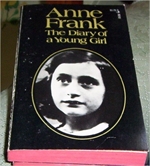
Challenged at the Culpeper County, Va. public school (2010) by a parent requesting that her daughter not be required to read the book aloud. Initially, it was reported that officials have decided to stop assigning a version of Anne Frank's diary, one of the most enduring symbols of the atrocities of the Nazi regime, due to the complaint that the book includes sexual material and homosexual themes. The director of instruction announced the edition, published on the fiftieth anniversary of Frank's death in a concentration camp, will not be used in the future despite the fact the school system did not follow its own policy for handling complaints. The remarks set off a hailstorm of criticism online and brought international attention to the 7,600-student school system in rural Virginia. The superintendent said, however, that the book will remain a part of the English classes, although it may be taught at a different grade level.
Source: Newsletter on Intellectual Freedom, Mar. 2010, pp. 57-58; May 2010, p. 107.
Fuentes, Carlos
Aura
Farrar

Banned from the curriculum in Puerto Rican public high schools (2009) along with four other books because of coarse language. Written by one of Latin America’s most prominent contemporary writers, the novel contains a brief romantic encounter beneath a crucifix. It is a scene that prompted Mexico’s former interior secretary to try to have the book dropped from a reading list at his daughter’s private school, without success. Fuentes said that the attempt boosted sales of the book. The other titles banned were: Antologia personal, by José Luis González; Mejor te lo cuento: antologia personal, 1978-2005, by Juan Antonio Ramos; Reunión de espejos, by José Luis Vega; and El entierro de Cortijo: 6 de octubre de 1982, by Edgardo Rodriguez Juliá.
Source: Newsletter on Intellectual Freedom, Nov. 2009, p. 204.
Garrison, Eric Marlowe
Mastering Multiple Position Sex
Quiver

Challenged, but retained at the Pataskala, Ohio Public Library (2009). The library determined to implement a new juvenile library card. A parent or guardian will be able to sign off on the card, thereby restricting his or her child’s borrowing rights to juvenile materials.
Source: Newsletter on Intellectual Freedom, Jan. 2010, pp. 12-13; Mar. 2010, p. 53.
Hahn, Mary Downing
The Dead Man in Indian Creek
Clarion Books; Sandpiper

Challenged at the Salem-Keizer School District, Oreg. elementary schools (2010) because of the drugs and drug smuggling activities in the book. The book was previously challenged in 1994 in the same school district because of graphic violence, examples of inappropriate parenting and because it was too frightening for elementary students. The book has won awards from the International Reading Association, the Children’s Book Council, and the American Library Association.
Source: Newsletter on Intellectual Freedom, May 2010, pp. 105-6.
Harding, Kat
Lesbian Kama Sutra
Thomas Dunne Books

Restricted minors’ access in the Topeka and Shawnee County, Kans. Public Library (2009) because the organization Kansans for Common Sense contended that the material is “harmful to minors under state law." Later the board voted 6-3 in favor of adopting a staff recommendation to keep the books where they are currently located on the shelves in the library's Health Information Neighborhood section.
Source: Newsletter on Intellectual Freedom, May 2009, pp. 77-78; July 2009, p. 139.
Hartinger, Brent
Geography Club
HarperTempest

Challenged at the West Bend, Wis. Community Memorial Library (2009) as being “obscene or child pornography” in a section designated “Young Adults." The library board unanimously voted 9–0 to maintain, “without removing, relocating, labeling, or otherwise restricting access,” the books in the young adult category at the West Bend Community Memorial Library. The vote was a rejection of a four-month campaign conducted by the citizen’s group West Bend Citizens for Safe Libraries to move fiction and nonfiction books with sexually explicit passages from the young adult section to the adult section and label them as containing sexual material.
Source: Newsletter on Intellectual Freedom, May 2009, pp. 80-81; Sept. 2009, pp. 169-70.
Hemingway, Ernest
Hills Like White Elephants: A Short Story: The Complete Short Stories of Ernest Hemingway
Scribner

Pulled from a Litchfield, N.H. Campbell High School elective course classroom (2009) after parents voiced their concerns about a short-stories unit called “Love/Gender/Family Unit” that dealt with subject matters including abortion, cannibalism, homosexuality, and drug use. The parents said the stories promoted bad behavior and a “political agenda” and they shouldn’t be incorporated into classroom teachings. The Campbell High School English curriculum adviser eventually resigned.
Source: Newsletter on Intellectual Freedom, Sept. 2009, p. 154.
Hitler, Adolf
Mein Kampf
Houghton

Plans by German scholars to reprint as an academic treatise were rejected by the state copyright holders (2009), who said a new edition of the book could fuel support for far-right groups. The Bavarian authorities reaffirmed a sixty-four-year-old ban on the book after the Munich-based Institute of Contemporary History, or IFZ, applied for permission to reprint the work.
Source: Newsletter on Intellectual Freedom, Sept. 2009, pp. 155-56.
Irving, John
A Prayer for Owen Meany
Ballantine; Morrow

Removed from the Pelham, Mass. school district recommended summer reading list (2009) after a parent complained about the novel’s objectionable language and sexuality.
Source: Newsletter on Intellectual Freedom, Sept. 2009, pp. 153-54.
Johnson, Maureen
The Bermudez Triangle
Razorbill

Challenged at the Leesburg, Fla. Public Library (2009) because of sexual innuendo, drug references, and other adult topics.
Source: Newsletter on Intellectual Freedom, July 2009, p. 131.
King, Stephen
Survivor Type: A Short Story from Skeleton Crew
Signet

Pulled from a Litchfield, N.H. Campbell High School elective course classroom (2009) after parents voiced their concerns about a short-stories unit called “Love/Gender/Family Unit” that dealt with subject matters including abortion, cannibalism, homosexuality, and drug use. The parents said the stories promoted bad behavior and a “political agenda” and they shouldn’t be incorporated into classroom teachings. The Campbell High School English curriculum adviser eventually resigned.
Source: Newsletter on Intellectual Freedom, Sept. 2009, p. 154.
Kingsolver, Barbara
The Bean Trees
Harper

Challenged at the William S. Hart Union High School District in Saugus, Calif. (2009) as required summer reading for the honors English program because the novel includes sexual scenes and vulgar language. Students have the option of alternative assignments that still meet objectives and teaching goals.
Source: Newsletter on Intellectual Freedom, Jan. 2010, pp. 15-16.
Klausen, Jytte
The Cartoons That Shook the World
Yale Univ. Press

Yale University Press in New Haven, Conn. (2009) removed twelve cartoons of the Prophet Muhammad from an upcoming book about how they caused outrage across the Muslim world, citing fears of violence. A Danish newspaper originally published the cartoons -- including one depicting Muhammad wearing a bomb-shaped turban -- in 2005. Other Western publications reprinted them. The following year, the cartoons triggered massive protests from Morocco to Indonesia. Rioters torched Danish and other Western diplomatic missions. Some Muslim countries boycotted Danish products. Islamic law generally opposes any depiction of the prophet, even favorable, for fear it could lead to idolatry.
Source: Newsletter on Intellectual Freedom, Nov. 2009, pp. 204-07.
Knowles, Jo (Johanna Beth)
Lessons from a Dead Girl
Candlewick Press

Withdrawn from classroom use and the approved curriculum at the Montgomery County, Ky. High School (2009), but available at the high school library and student book club. Some parents have complained about five novels containing foul language and cover topics -- including sex, child abuse, suicide, and drug abuse -- unsuited for discussion in coed high school classes. They also contend that the books don’t provide the intellectual challenge and rigor that students need in college preparatory classes. The titles appeared on suggested book lists compiled by the Young Adult Library Services Association, a division of the American Library Association, for twelve- to eighteen-year-olds who are “reluctant readers.” The superintendent removed the book because it wasn't on the pre-approved curriculum list and couldn't be added by teachers in the middle of a school year without permission.
Source: Newsletter on Intellectual Freedom, Jan. 2010, pp. 16-17; Mar. 2010, p. 56.
Lee, Harper
To Kill a Mockingbird
Lippincott/Harper; Popular Library

Removed from the St. Edmund Campion Secondary School classrooms in Brampton, Ontario, Canada (2009) because a parent objected to language used in the novel, including the word “nigger.”
Source: Newsletter on Intellectual Freedom, Nov. 2009, pp. 203-04.
Lippman, Laura
The Crack Cocaine Diet: A Short Story from Hardly Knew Her
Avon

Pulled from a Litchfield, N.H. Campbell High School elective course classroom (2009) after parents voiced their concerns about a short-stories unit called “Love/Gender/Family Unit” that dealt with subject matters including abortion, cannibalism, homosexuality, and drug use. The parents said the stories promoted bad behavior and a “political agenda” and they shouldn’t be incorporated into classroom teachings. The Campbell High School English curriculum said the short story was not intended to glorify bad behavior, rather, it was chosen for its tone and point of view and to show the often devastating consequences of drug use. The English curriculum adviser eventually resigned.
Source: Newsletter on Intellectual Freedom, Sept. 2009, p. 154.
Martin, Michael
Kurt Cobain
Capstone Press

Removed from all elementary and middle Farmington, Minn. school libraries (2009) because the book was "very dark and violent and made references to the use of Ritalin as being a precursor to the use of illicit drugs. It also covered topics such as mental illness and suicide."
Source: Newsletter on Intellectual Freedom, Jan. 2010, p. 11.
McDonald, Brian
In the Middle of the Night: The Shocking True Story of a Family Killed in Cold Blood
St. Martin

Challenged at the Cheshire, Conn. Public Library (2009). McDonald’s book revisits 2007, when Joshua Komisarjevsky and Steven Hayes allegedly invaded the Cheshire home of Dr. William Petit, beating him with a baseball bat and raping, torturing, and murdering his wife and two daughters. Complainants want the book kept off the library shelves until the men accused of the crime have been tried.
Source: Newsletter on Intellectual Freedom, Jan. 2010, pp. 7-8; Mar. 2010, p. 51.
Mead, Richelle
Vampire Academy series
Razorbill

Banned at Henderson Junior High School in the Stephenville, Tex. Independent School District (2009). The entire teen vampire series was banned for sexual content or nudity. Since the series has not been completed, "Stephenville ISD actually banned books that have not yet been published and perhaps even books that have yet to be written. There is no way the district could know the content of these books, and yet they have been banned."
Source: Newsletter on Intellectual Freedom, Nov. 2009, pp. 197-98, 225.
Merriam-Webster Editorial Staff
Merriam-Webster Collegiate Dictionary
Merriam-Webster

Pulled from the Menifee, Calif. Union School District (2010) because a parent complained when a child came across the term “oral sex.” Officials said the district is forming a committee to consider a permanent classroom ban of the dictionary.
Source: Newsletter on Intellectual Freedom, Mar. 2010, p. 55.
Meyer, Stephenie H.
Twilight series
Little
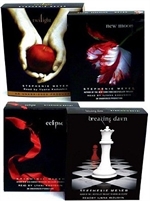
Banned in Australia (2009) for primary school students because the series is too racy. Librarians have stripped the books from shelves in some junior schools because they believe the content is too sexual and goes against religious beliefs. They even have asked parents not to let kids bring their own copies of Stephenie Meyer’s smash hit novels -- which explore the stormy love affair between a teenage girl and a vampire -- to school.
Source: Newsletter on Intellectual Freedom, Nov. 2009, pp. 207-08.
Moore, Alan
The League of Extraordinary Gentlemen: Black Dossier
America’s Best Comics

Challenged at the Jessamine County Public Library in Nicolasville, Ky. (2009). A petition with 950 signatures was presented to the board to overturn its collection policy. The petition specifically asked for the removal of four works on the grounds that they “offended me in that they depict sexual acts and/or describe such acts in a way that in my opinion are contrary to the Jessamine County public opinion” of what should be in a public, taxpayer-supported collection. The petition concluded the works constituted a public safety issue in that they encourage sexual predators. In addition to Moore's graphic novel, the other works challenged were Snuff, by Chuck Palahniuk, Choke, a DVD based on a novel by Palahniuk; and the DVD Ron White: You Can’t Fix Stupid. The graphic novel eventually got two employees fired for breaching library policies, the library director was threatened with physical harm, and the book was recataloged, along with other graphic novels with mature trends, to a separate but unrestricted graphic novels section of the library.
Source: Newsletter on Intellectual Freedom, Jan. 2010, pp. 8-9; Mar. 2010, p. 52.
Morrison, Toni
Song of Solomon
Knopf; NAL
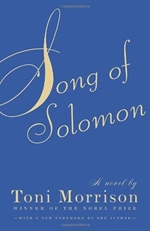
Reinstated in the Shelby, Mich. school Advanced Placement English curriculum (2009), but parents are to be informed in writing and at a meeting about the book's content. Students not wanting to read the book can choose an alternative without academic penalty. The superintendent had suspended the book from the curriculum.
Source: Newsletter on Intellectual Freedom, July 2009, pp. 140-41.
Myracle, Lauren
ttyl
Amulet Books

Challenged, but retained at the John Muir Middle School library in Wausau, Wis. (2009) despite a parent's request that the book be removed because of sexually explicit content. The author said, "The book's dialogue about sex and alcohol is frank but the characters criticize those who engage in those behaviors." Retained in the Ponus Ridge Middle School library in Norwalk, Conn. (2010). While many critics decry its style as “grammatically incorrect,” most who take exception point to its foul language, sexual content, and questionable sexual behavior. It is the first book written entirely in the format of instant messaging – the title itself is a shorthand reference to “talk to you later.”
Source: Newsletter on Intellectual Freedom, July 2009, p. 140; May 2010, p. 127.
Richardson, Justin, and Peter Parnell
And Tango Makes Three
Simon
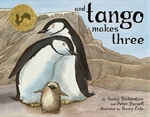
Challenged, but retained in the North Kansas City, Mo. schools (2009) despite a parent’s concern that the book wasn’t age-appropriate, didn't follow the district’s policy on human sexuality education, and tries to indoctrinate children about homosexuality. The illustrated book is based on a true story of two male penguins that adopted an abandoned egg at New York City's Central Park in the late 1990s. In subsequent discussions, the schools appear to be headed towards segregating elementary school libraries according to “age appropriateness.” Students might be restricted to view or check out materials in their own age-class or younger.
Source: Newsletter on Intellectual Freedom, Mar. 2010, pp. 52-53, 73.
Schrag, Ariel, ed.
Stuck in the Middle: Seventeen Comics from an Unpleasant Age
Viking

Pulled from the school library collections at two Sioux Falls, S.Dak. public middle schools (2009). The book is the work of sixteen cartoonists who recreated true tales from their middle-school years. The book’s major themes are bullying and boy-girl awkwardness. Masturbation and marijuana show up in passing, and several of the vignettes include words most parents wouldn’t want to hear from their children.
Source: Newsletter on Intellectual Freedom, Jan. 2010, p. 13.
Scott, Elizabeth
Living Dead Girl
Simon Pulse

Challenged, but retained at the Effingham, Ill. Helen Matthes Library (2009) despite concerns about its graphic content and the unsatisfactory ending. The book is about a fifteen-year-old’s perspective of living with her captor after being forcibly kidnapped and imprisoned at the age of ten. The book has received several accolades from book critics.
Source: Newsletter on Intellectual Freedom, Nov. 2009, pp. 219-20.
Sedaris, David
I Like Guys: A Short Story from Naked
Back Bay Books

Pulled from a Litchfield, N.H. Campbell High School elective course classroom (2009) after parents voiced their concerns about a short-stories unit called “Love/Gender/Family Unit” that dealt with subject matters including abortion, cannibalism, homosexuality, and drug use. The parents said the stories promoted bad behavior and a “political agenda” and they shouldn’t be incorporated into classroom teachings. The Campbell High School English curriculum adviser said the short story was selected not only for its tone and style, but also its message of respect and acceptance, not for advocating homosexuality. The English curriculum adviser eventually resigned.
Source: Newsletter on Intellectual Freedom, Sept. 2009, p. 154.
Seierstad, Åsne
The Bookseller of Kabul
Little; Virago

Challenged, but retained on Wyoming, Ohio high school district's reading list (2009) despite concerns about its sexual content. After a second challenge to a different title, the district reviewed all books on reading lists. Staff members rated each book on its relationship to the course, its uniqueness, its appropriateness, and the extent to which it “could create controversy among students, parents, and community groups.”
Source: Newsletter on Intellectual Freedom, Nov. 2009, pp. 202-03.
Selzer, Adam
How to Get Suspended and Influence People
Delacorte

Challenged at the Nampa, Idaho Public Library (2009) by a parent appalled that the cover included an abstract drawing of a nude woman and the back cover contains some profanity. The book explores the theme of censorship through the eyes of a gifted eighth-grader who is suspended after making an avant-garde sex-education video for a class project.
Source: Newsletter on Intellectual Freedom, Jan. 2010, p. 8.
Shusterman, Neal
Unwind
Simon & Schuster

Withdrawn from classroom use and the approved curriculum at the Montgomery County, Ky. High School (2009), but available at the high school library and student book club. Some parents have complained about five novels containing foul language and cover topics -- including sex, child abuse, suicide, and drug abuse -- unsuited for discussion in coed high school classes. They also contend that the books don’t provide the intellectual challenge and rigor that students need in college preparatory classes. The titles appeared on suggested book lists compiled by the Young Adult Library Services Association, a division of the American Library Association, for twelve- to eighteen-year-olds who are “reluctant readers.” The superintendent removed the book because it wasn't on the pre-approved curriculum list and couldn't be added by teachers in the middle of a school year without permission.
Source: Newsletter on Intellectual Freedom, Jan. 2010, pp. 16-17; Mar. 2010, p. 56.
Silverstein, Charles, and Felice Picano
The Joy of Gay Sex
Harper

Challenged in the Lewis and Clark Library in Helena, Mont. (2008) due to objections over its content. The book has been in the library’s collection since 1993. The library director accepted the recommendation of the library’s collection review committee that the book be retained in the collection. Restricted minors’ access in the Topeka and Shawnee County, Kans. Public Library (2009) because the organization Kansans for Common Sense contended that the material is “harmful to minors under state law." Later the board voted 6-3 in favor of adopting a staff recommendation to keep the books where they are currently located on the shelves in the library's Health Information Neighborhood section.
Source: Newsletter on Intellectual Freedom, Nov. 2008, pp. 231-32, 254-55; May 2009, pp. 77-78; July 2009, p. 139.
Snyder, Zilpha Keatley
The Egypt Game
Dell; Macmillan

Challenged as part of a reading list in a fourth-grade class at Southern Hills Elementary School in Wichita Falls, Tex. (2009) because the book includes scenes depicting Egyptian worship rituals. The Newbery Award-winning book has been an optional part of the school district's curriculum for years. “I’m not going to stop until it’s banned from the school district. I will not quiet down. I will not back down. I don’t believe any student should be subjected to anything that has to do with evil gods or black magic,” said the student’s father.
Source: Newsletter on Intellectual Freedom, Jan. 2010, p. 17.
Sones, Sonya
One of Those Hideous Books Where the Mother Dies
Simon & Schuster

Challenged, retained at the Theisen Middle School in Fond du Lac, Wis. (2010) despite a parent’s belief that the book's "sexual content was too mature for eleven- to fourteen-year-olds.” The book has won several awards, including being named a 2005 Best Book for Young Adults by the American Library Association. The same parent plans to request removal of six other books from the library, including the Sisterhood of the Traveling Pants series, another set of books by Sones, and Get Well Soon, by Julie Halpern.
Source: Newsletter on Intellectual Freedom, Mar. 2010, p. 54; May 2010, pp. 127-28.
Toriyama, Akira
Dragon Ball: The Monkey King
Viz Comics

Removed from the Wicomico County, Md. school media centers (2009) because the Japanese graphic novels depict some violence and show nudity.
Source: Newsletter on Intellectual Freedom, Jan. 2010, p. 9.
Von Ziegesar, Cecily
Only in Your Dreams: A Gossip Girl Novel
Little

Challenged at the Leesburg, Fla. Public Library (2009) because of sexual innuendo, drug references, and other adult topics. Responding to a call by parents, church, and community leaders to remove this novel along with twelve other provocative books available to teens at the Leesburg Public Library, city commissioners voted 4-1 to separate all books based on age groups. High-school books will be placed in a separate area in the library stairwell.
Source: Newsletter on Intellectual Freedom, July 2009, p. 131; Nov. 2009, p. 201.
Walker, Margaret
Jubilee
Houghton

Challenged at the Jacksonville, Ill. High School (2010) by a pastor who said he found the fictionalized story of the author’s grandmother, who was born as a slave in Georgia, “offensive” and “trashy” and a novel about the way of life in the Old South. “We believe it is to promote superiority for white people and to step on black people and make them feel inferior.” The Ku Klux Klan challenged the novel in South Carolina in 1977 because it produces “racial strife and hatred.”
Source: Newsletter on Intellectual Freedom, May 2010, pp. 104-5.
Walls, Jeannette
The Glass Castle: A Memoir
Scribner
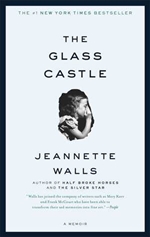
Challenged at the William S. Hart Union High School District in Saugus, Calif. (2009) as required summer reading for the honors English program. The 2005 memoir chronicles the author's harsh childhood and family life and includes profanity, criticisms of Christianity, and accounts of sexual abuse and prostitution. Students have the option of alternative assignments that still meet objectives and teaching goals.
Source: Newsletter on Intellectual Freedom, Jan. 2010, pp. 15-16.
WritersCorp
Paint Me Like I Am: Teen Poems
HarperTempest

The principal at the Landis Intermediate School in Vineyard, N.J. (2009) removed two pages that included the poem "Diary of an Abusive Stepfather" after a thirteen-year-old Landis student's mother questioned its appropriateness. The thirty-one-line poem is peppered with profanity and details a violent relationship between an adult and child. San Francisco-based Writers Corps, an art organization linking writers with teens in urban areas to provide outlets for their experiences, produced the anthology. Retained in the combined middle and high school library in the North Fond du Lac, Wis. School District (2010) provided it has a label designating it as appropriate for high school students. Younger students could also access the book with prior parental permission. A parent asked the school district to reconsider the book due to mature language.
Source: Newsletter on Intellectual Freedom, July 2009, pp. 131-32; May 2010, pp. 128-29.

 iREAD Summer Reading Programs
iREAD Summer Reading Programs Latest Library JobLine Listings
Latest Library JobLine Listings